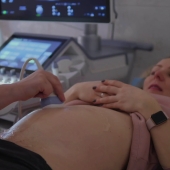During pregnancy, your and your baby's health is of utmost importance. Flying is possible while pregnant. You just need to know when you can go and how to look after both yourself and the baby while up in the air.
1. Stay hydrated on the flight: Pregnant women tend to become dehydrated quicker so make sure you have some water to sip while in the air. On an average 3 hour flight you can lose up to 1.5 litres! Vitamin-rich fruit like oranges, grapes or kiwis will help with hydration.
2. Pack wisely with multiple layers: Any pregnant woman knows the torture of hot flushes, so wear thin layered clothing that you can take off when needed. A loose fitting, comfy pair of shoes is a must for potential foot swelling, and a travel pillow and blanket will keep you cosy when temperatures drop and allow you to nap if you encounter any delays.
3. Don’t rush: When you’re carrying a very delicate cargo you don’t want to be running through the airport or panicking in the queue for security. To avoid all the stress of last minute airport dashes, add an hour onto your journey and if you don’t need the extra time you can sit and have a leisurely tea before you stroll calmly onto your plane, relaxed and ready for your holiday.
4. Don’t worry: Flying while pregnant up till 28 weeks is perfectly safe and most airlines will let a healthy mum-to-be travel up to 36 weeks with a safe to fly certificate from a doctor/midwife. The limit for multiple pregnancy is generally 32 weeks. There’s no need to worry about the airport metal detectors or x-rays either, these are perfectly safe, and even flying itself has been proven to be fine for your unborn baby.
5. Choose the aisle seat: Try to reserve your seats early and opt for the aisle so you can move around or take bathroom breaks as much as you need. When seated, make sure your seat belt buckles underneath your bump and if baby is too big, ask a steward for a seat belt extender, most flights carry them.
6. Wear compression socks and keep moving: Pregnant ladies are at a slightly higher risk of developing deep vein thrombosis (DVT) while flying. Don’t panic though, just make sure to move around regularly, we recommend moving for three to four minutes every hour. Practice exercises like stretching your legs and rolling your ankles left and right, or consider wearing a pair of compression socks to help keep the circulation flowing and avoid swelling.
7. Think about the flight time: Long haul flights can be a struggle when you’re pregnant so it could be a good idea to plan your holiday a little closer to home; try to aim for only three or four hours in the sky. Destinations like the Canaries or Balearic Islands are just a short flight away and can offer just as much sun and relaxation as a long haul destination.
8. Avoid heavy lifting: If you have large luggage try to use ones with wheels to avoid heavy lifting. It’s always a good idea to ask the cabin crew to help when getting any heavy luggage in or out of the overhead locker.
- 3915 views













